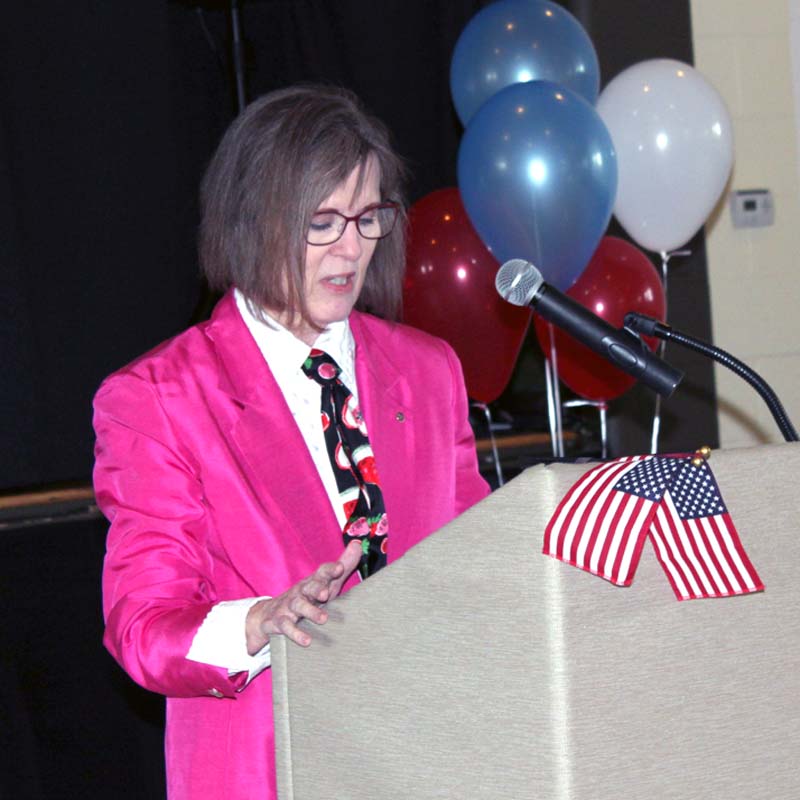 J-Ad Graphics Editor Rebecca Pierce was keynote speaker at the annual Law Day observance in Barry County on May 1, which had the theme “Free Speech Free Press Free Society.”
J-Ad Graphics Editor Rebecca Pierce was keynote speaker at the annual Law Day observance in Barry County on May 1, which had the theme “Free Speech Free Press Free Society.”
What follows are some excerpts from Pierce’s remarks about the challenges facing newspapers today.
“In the United States and around the world, freedom of speech and the press are among the most important foundations for a free society. Free speech and free press are prominent topics in public discourse and litigation.
“It is impossible to imagine a free society without these individual liberties, yet historical and current debates surrounding them continually challenge us to consider their boundaries and resilience.
“What we practice here is called community journalism, which is locally-oriented, professional news coverage that typically focuses on city neighborhoods and small towns.
Stories papers publish can have an outsized impact on the decisions made by residents in those communities, and, ultimately, on the quality of their lives.
“By some estimates, community newspapers provide as much as 85 percent of ‘the news that feeds democracy’ at the state and local levels…the fates of newspapers and communities are inherently linked. If one fails, the other suffers.
“Content is what truly engages and serves readers. It's the content – and the people who know how to report and edit content. The number of journalists in this country, in the past decade, has plummeted – from over 400,000 to slightly more than 100,000. The content they produced is missing.”
Pierce said changes in technology have reshaped how free speech and free press work in the everyday world, raising serious concerns about the future of free speech, including “attempts at censorship by government actors critical of comments on social media, the shifting standards of private platforms to censor online expression and the rise of hate and extremist speech in the digital world.”
A two-year study by the School of Media and Journalism at the University of North Carolina noted the emergence of a new type of newspaper owner, very different from traditional publishers -- the best of whom sought to balance business interests with civic responsibility to the community where their paper was located, Pierce said.
“Since 2004, more than a third of the country’s newspapers have changed ownership; some sold two or more times. Then these new owners cut costs and recoup their investment in only a few short years. Whole newspaper chains have disappeared, acquired by other companies.
“As newspapers confront an uncertain future, the choices these new owners make could determine whether vast ‘news deserts’ arise in communities and regions throughout the country. This has implications not just for the communities where these papers are located, but also, in the long term, for America.
“Strong newspapers enhance the quality of life by producing journalism that documents a community’s life and identifies its issues, while providing advertising that connects consumers with local businesses. But some communities have already become so-called news deserts, having lost their local newspapers.
“For two centuries, newspapers have been an indispensable auditor of democracy at all levels in this county. By documenting the shifting landscape of newspaper ownership and assessing the threat of news deserts, we all need to be aware that we the greater role we all must play to protect and preserve our local news institutions as we address the challenges confronting media and our democracy.
“Concerns about the role and ownership of newspapers have been voiced and debated since the founding of the country. However, the dramatic shift in ownership of newspapers over the past decade brings added urgency to a new version of an age-old question: In the digital age, what is the civic responsibility of newspaper owners to their communities?
“We need to do all we can to protect and preserve the freedoms we hold dear – and one of those freedoms, of the press, is represented in this community, with the owner here and a staff of reporters and editors on duty right now, just down the street.
“What can you do to protect and preserve it? Invest in this local institution by subscribing, advertising, reading and engaging in the community conversation. Suggest stories. Criticize whatever deserves it. Add your input to make what we do even better,” she said.
Robert R. McCormick, publisher of the Chicago Tribune from 1925 to 1955 said: “A newspaper is an institution developed by modern civilization to present the news of the day, to foster commerce and industry, to inform and lead public opinion, and to furnish that check upon government which no constitution has ever been able to provide.”
Photo: Rebecca Pierce, editor at J-Ad Graphics, speaks on Law Day.














